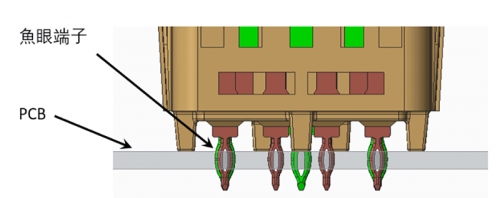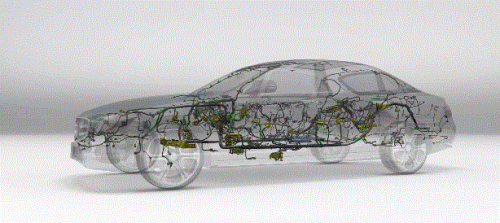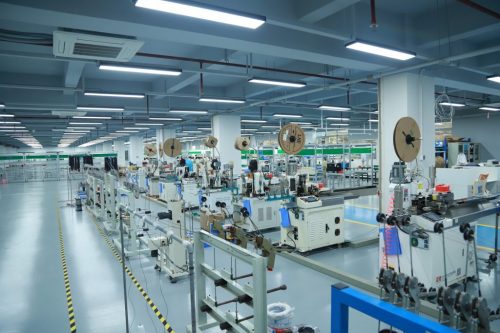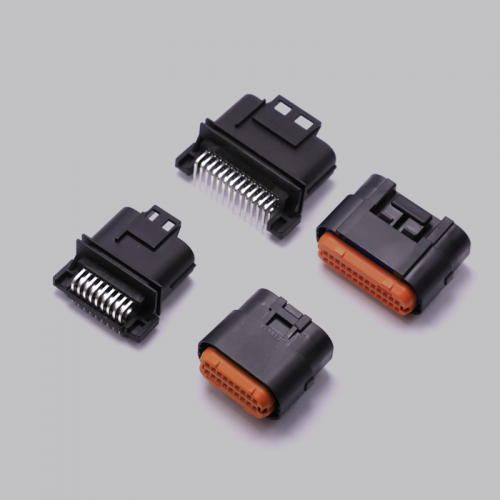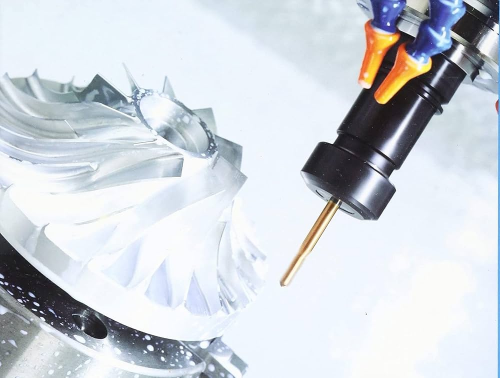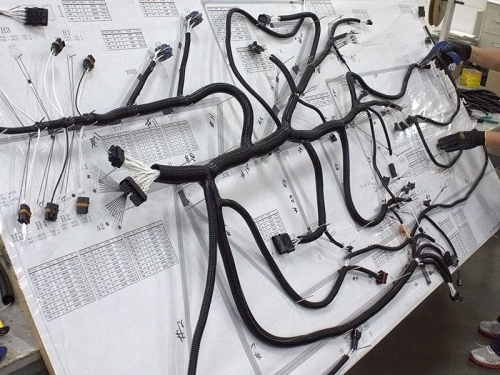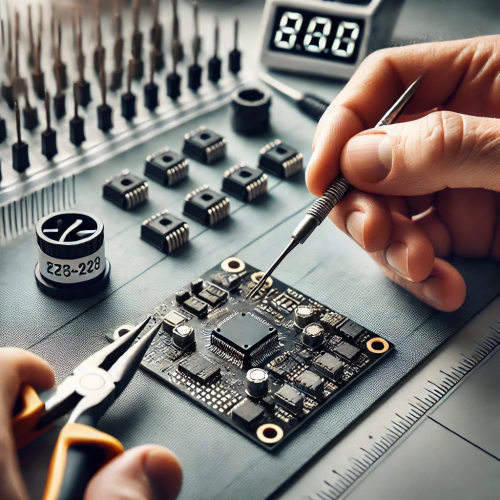Computer connectors are the unsung heroes of the digital age, ensuring seamless communication between our numerous electronic devices. One company that stands out in this critical industry is KONNRA, an electronic company renowned for its high-quality, innovative connectors. In this blog, we’ll explore the world of computer connectors, their evolution, key features, types, and the factors to consider when choosing a connector manufacturer. We will also delve into future trends and challenges in the industry.

Ⅰ. Introduction to Computer Connectors
1.Definition:
Computer connectors are physical interfaces that link various electronic devices, enabling data transfer, power supply, and communication. These connectors are fundamental in the electronics industry, facilitating the interaction between hardware components within a single computer or between multiple systems.
2.Importance:
Computer connectors are crucial for the smooth functioning of electronic devices. They ensure that connections are stable and reliable, allowing devices to communicate effectively and perform optimally. Without quality connectors, we would experience frequent connectivity problems, reduced device performance, and potential hardware damage.
Ⅱ. Evolution of Computer Connectors
1.Historical Perspective:
The evolution of computer connectors has been remarkable. In the early days of computing, connectors were often large, cumbersome, and inefficient. These early connectors provided basic functionality, but they were limited in terms of speed, durability, and ease of use. For instance, the RS-232 serial port, used for connecting mice and modems, was bulky and had slow data transfer rates.
As technology progressed, the need for more efficient and versatile connectors became evident. This led to the development of standardized interfaces. A significant milestone was the introduction of the USB (Universal Serial Bus) in the mid-1990s. USB replaced numerous types of connectors with a single, universal standard, making it much easier to connect peripherals like keyboards, mice, printers, and storage devices. The simplicity and versatility of USB quickly made it the industry standard.
2.Technological Advancements:
Advancements in technology have dramatically improved the performance and functionality of computer connectors. Key developments include:
a.Speed:
Modern connectors support much higher data transfer rates than their predecessors. For example, USB 3.0 offers speeds up to 5 Gbps, which is significantly faster than the 12 Mbps provided by USB 1.1. Thunderbolt 4, introduced more recently, supports speeds up to 40 Gbps, enabling rapid data transfer and smooth video streaming.
b.Size and Design:
Connectors have become more compact and efficient. The introduction of USB-C is a prime example. USB-C is a small, reversible connector that can handle power delivery, data transfer, and video output, all through a single cable. This has simplified device design and reduced the number of ports needed on modern devices.
c.Durability:
The materials and construction methods used in connectors have also improved. Modern connectors are designed to withstand more insertions and removals without degrading in performance. Features like gold-plated contacts are used to enhance conductivity and resist corrosion, ensuring long-term reliability.
d.Functionality:
Connectors are now more versatile, supporting multiple functions. Thunderbolt 4, for instance, combines data transfer, video output, and power delivery in one connector. This multi-functionality is crucial for modern devices that require high performance in a compact form factor.
Ⅲ. Key Features of High-Quality Computer Connectors
1.Durability and Reliability:
A high-quality computer connector must be durable and reliable. It should withstand repeated plugging and unplugging without degradation in performance. The materials used, such as gold-plated contacts, enhance conductivity and resist corrosion, ensuring a long lifespan.
2.Performance Criteria:
Key performance criteria for connectors include signal integrity, speed, and compatibility. Signal integrity ensures that data is transmitted accurately without loss or interference. High-speed connectors are crucial for tasks requiring fast data transfer, such as video editing or gaming. Compatibility ensures that connectors work seamlessly with a wide range of devices and standards.
3.Material and Design:
The choice of materials and design significantly impacts the quality of connectors. High-grade materials like gold, copper, and certain alloys are preferred for their excellent conductive properties. Design aspects such as shielding to prevent electromagnetic interference and robust housings to protect internal components are also critical.
Ⅳ. Major Types of Computer Connectors
1.USB (Universal Serial Bus):
USB is the most widely used data connector, offering several versions tailored to different performance needs:
a.USB 2.0:
Provides data transfer speeds up to 480 Mbps, suitable for connecting peripherals like keyboards, mice, and basic storage devices.
b.USB 3.0 and 3.1:
Offer significantly higher data transfer speeds (up to 5 Gbps and 10 Gbps respectively), ideal for high-speed data transfer tasks such as external hard drives and high-resolution webcams.
c.USB-C:
A versatile, reversible connector that supports data transfer, video output, and power delivery. USB-C is becoming the standard for modern devices due to its compact size and multi-functionality.
2.Display Connectors:
a.HDMI (High-Definition Multimedia Interface):
Transmits high-definition video and audio between devices. HDMI connectors are standard in consumer electronics such as TVs, monitors, and gaming consoles. They support resolutions up to 4K and 8K, making them suitable for high-definition content.
b.DisplayPort:
Similar to HDMI but primarily used in computer monitors for high-resolution displays. DisplayPort supports higher resolutions and refresh rates, making it ideal for professional graphics work and gaming. It also allows for daisy-chaining multiple monitors.
c.VGA (Video Graphics Array) and DVI (Digital Visual Interface):
Older standards for video connections. VGA is an analog connector used in older monitors and projectors, while DVI offers a digital signal for improved video quality. Both are still found in legacy systems and some specialized applications.
3.Power Connectors:
a.DC Connectors:
Provide direct current (DC) power to devices. These connectors come in various sizes and configurations, commonly used in laptops, routers, and other consumer electronics.
b.Power over Ethernet (PoE):
Combines power and data transmission over a single Ethernet cable, reducing the need for separate power supplies. PoE is used in network devices like IP cameras, wireless access points, and VoIP phones, providing both data connectivity and power.
4.Specialized Connectors:
a.SATA (Serial ATA):
Connects internal storage devices like hard drives (HDDs) and solid-state drives (SSDs) to the computer’s motherboard. SATA connectors support high-speed data transfer rates and are essential for modern computing systems that require fast and reliable storage.
b.PCIe (Peripheral Component Interconnect Express):
Used for connecting internal components such as graphics cards, sound cards, and network cards to the motherboard. PCIe connectors offer high data transfer rates and are crucial for performance-intensive applications like gaming, video editing, and data processing.
Ⅴ. Leading Connector Manufacturers: KONNRA
1.Overview of KONNRA:
KONNRA is a leading electronic company known for its high-quality connectors. With a strong emphasis on innovation and quality, KONNRA has established itself as a reliable manufacturer in the industry, catering to various sectors including consumer electronics, automotive, and industrial applications.
2.Innovation and Quality:
KONNRA’s commitment to innovation is evident in its extensive range of connectors that meet the evolving needs of modern technology. The company invests heavily in research and development to create products that offer superior performance, durability, and versatility.
3.Case Studies:
Consumer Electronics: KONNRA connectors are used in smartphones, tablets, and laptops, ensuring reliable connections for data transfer and charging.
Automotive Industry: Their connectors are critical in vehicle systems, supporting everything from infotainment to engine control units.
Industrial Applications: Robust connectors from KONNRA are used in industrial automation and machinery, where durability and performance are paramount.
Ⅵ. Choosing the Best Connector Manufacturer
When selecting a connector manufacturer, it’s essential to ensure that the products you receive are of the highest quality, reliable, and meet your specific requirements. Here are detailed factors to consider:
1.Quality and Reliability:
Quality Control Processes: Investigate the manufacturer’s quality control measures. Reputable manufacturers typically follow stringent quality assurance protocols to maintain high standards. Look for information on their testing procedures, such as thermal cycling, insertion/extraction cycles, and electrical performance testing.
Material Quality: The materials used in connectors significantly affect their performance and longevity. High-quality manufacturers use premium materials like gold-plated contacts for better conductivity and corrosion resistance.
Track Record: A manufacturer with a long history of producing reliable connectors is often a safer choice. Check for case studies or customer testimonials that highlight their product durability and performance in various applications.
2.Customization Options:
Tailored Solutions: Some applications may require connectors with specific designs, sizes, or functionalities. Ensure the manufacturer has the capability to provide customized solutions. This could include custom pin configurations, specialized housings, or unique cable assemblies.
Prototyping Services: Look for manufacturers that offer prototyping services. This can be crucial in developing and testing custom connectors before committing to full-scale production.
Flexibility and Responsiveness: Assess the manufacturer’s ability to respond to unique requirements and make adjustments as needed. A flexible manufacturer can adapt to changing project needs and timelines.
3.Support and Service:
Technical Assistance: Reliable after-sales support and technical assistance are vital. Choose a manufacturer that provides comprehensive customer service, including troubleshooting, installation guidance, and maintenance tips.
Warranty and Return Policies: Understand the warranty and return policies. A manufacturer confident in their product quality will offer favorable terms.
Training and Resources: Some manufacturers provide training sessions or detailed resources, such as manuals and online tutorials, to help you understand and maximize the use of their products.
4.Certifications and Compliance:
Industry Standards: Verify that the manufacturer adheres to relevant industry standards and holds certifications such as ISO 9001 (Quality Management Systems) and ISO 14001 (Environmental Management Systems). These certifications indicate a commitment to quality and sustainability.
Regulatory Compliance: Ensure the connectors comply with applicable regulatory standards, such as RoHS (Restriction of Hazardous Substances) and REACH (Registration, Evaluation, Authorization, and Restriction of Chemicals), which are essential for environmental and safety considerations.
Performance Certifications: Look for additional performance certifications specific to your industry, such as UL (Underwriters Laboratories) certification for safety in electrical components.
5.Reputation and Reviews:
Customer Feedback: Research customer reviews and testimonials. Positive feedback from other businesses and professionals in your industry can provide insight into the manufacturer’s reliability and product performance.
Industry Recognition: Manufacturers that have received industry awards or recognition can be trusted to have a good reputation for quality and innovation.
Case Studies and References: Request case studies or references from the manufacturer to understand how their connectors have performed in similar applications. This can give you confidence in their ability to meet your needs.
Ⅶ. Future Trends in Computer Connector Technology
1.Miniaturization:
As electronic devices become more compact, connectors are also becoming smaller. This trend towards miniaturization helps in designing sleek, portable gadgets without compromising performance.
2.Higher Speeds and Bandwidths:
The demand for faster data transfer rates continues to grow. Future connectors will support higher speeds and larger bandwidths, catering to the needs of high-definition video, virtual reality, and other data-intensive applications.
3.Wireless Connectors:
Wireless technology is advancing, reducing the need for physical connectors. Wireless charging and data transfer are becoming more prevalent, offering convenience and reducing cable clutter.
4.Sustainability:
Environmental concerns are driving the development of eco-friendly materials and manufacturing processes. Future connectors will increasingly incorporate sustainable materials and designs to minimize their environmental impact.
Conclusion: The Unseen Backbone of Technology
In conclusion, computer connectors are essential components that ensure the seamless operation of electronic devices. Manufacturers like KONNRA Computer Connectors play a pivotal role in delivering high-quality, innovative connectors that meet the evolving demands of modern technology. By understanding the various types of connectors, their evolution, key features, and the factors to consider when choosing a manufacturer, consumers and businesses can make informed decisions. As technology continues to advance, the importance of reliable connectors will only grow, underscoring their crucial role in our increasingly connected world.

